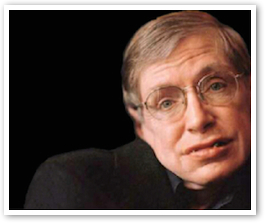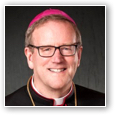Stephen Hawking: Great scientist, lousy theologian
- BISHOP ROBERT BARRON
Stephen Hawking was a great theoretical physicist and cosmologist, perhaps the most important since Einstein.
 It is only right that his remains have been interred alongside those of Isaac Newton in Westminster Abbey. He was, furthermore, a person of tremendous courage and perseverance, accomplishing groundbreaking work despite a decades-long struggle with the debilitating effects of Lou Gehrig's disease. And by all accounts, he was a man of good humor with a rare gift for friendship. It is practically impossible not to admire him. But boy was he annoying when he talked about religion!
It is only right that his remains have been interred alongside those of Isaac Newton in Westminster Abbey. He was, furthermore, a person of tremendous courage and perseverance, accomplishing groundbreaking work despite a decades-long struggle with the debilitating effects of Lou Gehrig's disease. And by all accounts, he was a man of good humor with a rare gift for friendship. It is practically impossible not to admire him. But boy was he annoying when he talked about religion!
In the last year of his life, Hawking was putting the finishing touches on a book that is something of a follow-up to his mega-bestselling A Brief History of Time. Called Brief Answers to the Big Questions, it is a series of short essays on subjects including time travel, the possibility of intelligent life elsewhere in the universe, the physics that obtains within a black hole, and the colonization of space. But chapter one is entitled simply "Is There a God?" To the surprise of no one who has been paying attention to Hawking's musings on the subject the last several years, his answer is no. Now, to anyone involved in the apologetics or evangelization game, this is, of course, depressing, since many people, especially the young, will say, "Well, there you have it: the smartest man in the world says that God does not exist." The problem is that one can be exceptionally intelligent in one arena of thought and actually quite naïve in another. This, I'm afraid, is the case with Stephen Hawking, who, though uniquely well-versed in his chosen field, makes a number of blunders when he wanders into the domains of philosophy and religion.
Things get off to a very bad start in the opening line of the chapter: "Science is increasingly answering questions that used to be the province of religion." Though certain primitive forms of religion might be construed as attempts to answer what we would consider properly scientific questions, religion, in the developed sense of the term, is not asking and answering scientific questions poorly; rather, it is asking and answering qualitatively different kinds of questions. Hawking's glib one-liner beautifully expresses the scientistic attitude, by which I mean the arrogant tendency to reduce all knowledge to the scientific form of knowledge. Following their method of empirical observation, hypothesis formation, and experimentation, the sciences can indeed tell us a great deal about a certain dimension of reality. But they cannot, for example, tell us a thing about what makes a work of art beautiful, what makes a free act good or evil, what constitutes a just political arrangement, what are the features of a being qua being — and indeed, why there is a universe of finite existence at all. These are all philosophical and/or religious matters, and when a pure scientist, employing the method proper to the sciences, enters into them, he does so awkwardly, ham-handedly.
Let me demonstrate this by drawing attention to Hawking's treatment of the last issue I mentioned — namely, why there should be a universe at all. Hawking opines that theoretical physics can confidently answer this question in such a way that the existence of God is rendered superfluous. Just as, at the quantum level, elementary particles pop into and out of existence regularly without a cause, so the singularity that produced the Big Bang simply came to be out of nothing, without a cause and without an explanation. The result, Hawking concludes, is that "the universe is the ultimate free lunch."
The first mistake — and armies of Hawking's followers make it — is to equivocate on the meaning of the word "nothing."
The first mistake — and armies of Hawking's followers make it — is to equivocate on the meaning of the word "nothing." In the strict philosophical (or indeed religious) sense, "nothing" designates absolute nonbeing; but what Hawking and his disciples mean by the term is in fact a fecund field of energy from which realities come and to which they return. The moment one speaks of "coming from" or "returning to," one is not speaking of nothing!
I actually laughed out loud at this part of Hawking's analysis, which fairly gives away the game: "I think the universe was spontaneously created out of nothing, according to the laws of science." Well, whatever you want to say about the laws of science, they're not nothing! Indeed, when the quantum theorists talk about particles popping into being spontaneously, they regularly invoke quantum constants and dynamics according to which such emergences occur. Again, say what you want about these law-like arrangements, they are not absolute nonbeing. And therefore, we are compelled to ask the question why should contingent states of affairs — matter, energy, the Big Bang, the laws of science themselves — exist at all? The classical response of religious philosophy is that no contingency can be explained satisfactorily by appealing endlessly to other contingencies. Therefore, some finally noncontingent reality, which grounds and actualizes the finite universe, must exist. And this uncaused cause, this reality whose very nature is to be, is what serious religious people call "God." None of Hawking's speculations — least of all his musings about the putative "nothing" from which the universe arises — tells against this conviction.
May I say by way of conclusion that I actually rather liked Stephen Hawking's last book. When he stayed within the confines of his areas of expertise, he was readable, funny, informative, and creative. But could I encourage readers please to take him with a substantial grain of salt when he speaks of the things of God?
 This is Meaghen Gonzalez, Editor of CERC. I hope you appreciated this piece. We curate these articles especially for believers like you.
This is Meaghen Gonzalez, Editor of CERC. I hope you appreciated this piece. We curate these articles especially for believers like you.
Please show your appreciation by making a $3 donation. CERC is entirely reader supported.

Acknowledgement
 Bishop Robert Barron. "Stephen Hawking: Great scientist, lousy theologian." Word on Fire (November 1, 2018).
Bishop Robert Barron. "Stephen Hawking: Great scientist, lousy theologian." Word on Fire (November 1, 2018).
Reprinted with permission of Bishop Robert Barron.
The Author
 Bishop Robert Barron is the founder of Word on Fire Catholic Ministries and bishop of the Diocese of Winona-Rochester in Minnesota. He is also the host of CATHOLICISM, a groundbreaking, award-winning documentary about the Catholic Faith, which aired on PBS. Bishop Barron is a #1 Amazon bestselling author and has published numerous books, essays, and articles on theology and the spiritual life. He is a religion correspondent for NBC and has also appeared on FOX News, CNN, and EWTN. Bishop Barron's website, WordOnFire.org, reaches millions of people each year, and he is one of the most-followed Catholics on social media. His regular YouTube videos have been viewed over 150 million times. Bishop Barron's pioneering work in evangelizing through the new media led Francis Cardinal George to describe him as "one of the Church's best messengers." He has keynoted many conferences and events all over the world, including the 2016 World Youth Day in Kraków, Poland, as well as the 2015 World Meeting of Families in Philadelphia, which marked Pope Francis' historic visit to the United States. He is author of Exploring Catholic Theology, And Now I See: A Theology of Transformation, Thomas Aquinas: Spiritual Master, Heaven in Stone and Glass: Experiencing the Spirituality of the Great Cathedrals, Eucharist (Catholic Spirituality for Adults), The Priority of Christ: Toward a Postliberal Catholicism, and Word on Fire: Proclaiming the Power of Christ.
Bishop Robert Barron is the founder of Word on Fire Catholic Ministries and bishop of the Diocese of Winona-Rochester in Minnesota. He is also the host of CATHOLICISM, a groundbreaking, award-winning documentary about the Catholic Faith, which aired on PBS. Bishop Barron is a #1 Amazon bestselling author and has published numerous books, essays, and articles on theology and the spiritual life. He is a religion correspondent for NBC and has also appeared on FOX News, CNN, and EWTN. Bishop Barron's website, WordOnFire.org, reaches millions of people each year, and he is one of the most-followed Catholics on social media. His regular YouTube videos have been viewed over 150 million times. Bishop Barron's pioneering work in evangelizing through the new media led Francis Cardinal George to describe him as "one of the Church's best messengers." He has keynoted many conferences and events all over the world, including the 2016 World Youth Day in Kraków, Poland, as well as the 2015 World Meeting of Families in Philadelphia, which marked Pope Francis' historic visit to the United States. He is author of Exploring Catholic Theology, And Now I See: A Theology of Transformation, Thomas Aquinas: Spiritual Master, Heaven in Stone and Glass: Experiencing the Spirituality of the Great Cathedrals, Eucharist (Catholic Spirituality for Adults), The Priority of Christ: Toward a Postliberal Catholicism, and Word on Fire: Proclaiming the Power of Christ.




